Search Results
Fine Jewelry University Articles matching: “Jade gemstone”
Showing only FJU Article results. Click here to show all results.
Fine Jewelry University (Show All FJU Articles)
-
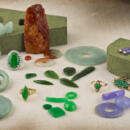
Gem in the Spotlight: Jade
Jade has one of the richest heritages of all gemstones. People have been using jade from as early as 6,000 BC, and it has been an incredibly important part of Asian, … history ever since. But, what is jade, and what has given it such a prominent place in human history? The term “jade” actually refers to two completely different gems: nephrite and jadeite. These are actually two unique mineral species, …have been confused for so many years, and are similar in many ways, they are both referred to by the blanket term “jade”. Both materials are silicates that have exceptional toughness, can be carved, and can be taken to a high polish. …
-
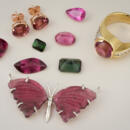
Gem in the Spotlight: Tourmaline
…. Care and Cleaning of Tourmaline Tourmaline makes a great gem in a ring for occasional wear or a pendant/earrings for daily wear. Because it isn’t exceptionally hard (Mohs hardness of 7-7.5), it should be stored away from other gemstones that could potentially damage it. Tourmaline should not be put into an ultrasonic cleaner or steam cleaned, and should only be cleaned with warm, soapy water. With proper care, a piece of tourmaline jewelry can last generations and even …
-

How Are Lab Grown Diamonds Made?
…, but none could ever be scientifically verified. The quest continued. Diamonds are a crystalline form of carbon, and so making artificial carbon crystal was the problem of lab grown diamonds. For decades, manufacturers of synthetic gemstones tried growing diamonds like they grew rubies, sapphires, and emeralds. It failed. Then they had the idea to grow diamonds in the lab like they grew in nature. High Pressure High Temperature Diamonds How does nature form diamond …
-

The Magic of Polarized Light
… Polarizing filters are critical to many fields of study. Without them, we wouldn’t be able to easily identify gemstones, TVs and monitors wouldn’t work in the same way, and the latest blockbuster movie wouldn’t pop off the screen the way it … allow them to function efficiently as they do without negative side effects. Using Polarized Light in Gemology Some gemstones, due to their unique chemical structure, actually polarize light themselves. These gems are doubly refractive (DR) …
-
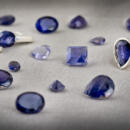
Gem in the Spotlight: Iolite
Iolite is maybe not the first gemstone people think of for their blue-violet jewelry, but it should be near the top of the list. Iolite’s color range of … color of the stone when it was first discovered. This adds value to many gem buyers who don’t want a treated gemstone. Color Me Impressed Iolite is strongly pleochroic and will exhibit a different color when viewed at different angles. … is caused by differing absorption of light rays in doubly refractive crystals. Thus, no singly refractive gemstone can exhibit pleochroism. The process works because of the ability of a gem to absorb different wavelengths of transmitted …
-
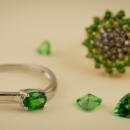
Gem in the Spotlight: Tsavorite Garnet
…and lively with a high refractive index giving it excellent sparkle and scintillation. Tsavorite is also a very rare gemstone. It is uncommon to find Tsavorite in sizes larger than five carats, and most faceted stones are below two carats. By… grossularite doesn’t exactly roll off the tongue. So, a proper name was definitely in order. The nomenclature of gemstones follows certain rules, and according to modern mineralogical methods, gemstones are given a name which ends in “-ite…
-
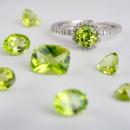
Gem in the Spotlight: Peridot
Peridot is a lovely yellow-green gem with a rich history. Legend has it that Peridot was the favorite gemstone of Cleopatra. The ancients called it the “gem of the sun”. It was believed that peridot could chase away evil …dissolve curses but only when set in gold. Peridot is the birthstone for August. It is also the accepted anniversary gemstone for the 16th year of marriage. Peridot’s unique yellow-green color is very attractive. The name “Peridot” is simply …
-
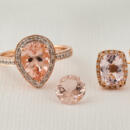
Gem in the Spotlight: Morganite
Morganite is a beautiful, soft pink gemstone and a graceful expression of elegance. It is not a very well-known gem, but it definitely should be. It is pastel or…salmon. It is the subtle, understated nature of Morganite’s color that sets it apart from many of the more popular gemstones. Morganite has an impressive family tree. It is a beryl gem which puts it in the same family as emerald and … pink variety of beryl “Morganite”. It has good hardness, durability, luster, and brilliance which make it a great gemstone for jewelry. For the gem nerds out there, here are a few of the gemological properties of Morganite. Its durability is…
-
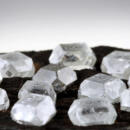
Is a Lab Grown Diamond Right for Me?
Picking a diamond for your engagement ring is a big decision. For most of us, buying a diamond is a significant financial undertaking, and we want to get it right. Unfortunately, understanding diamonds takes a lot of specialized knowledge that most people don’t have (anyone remember their refractive indexes from high school physics?). Even more unfortunately, the diamond industry suffers from a lot of misinformation and paranoia both from inside the trade and from outside observers. I have heard people say that natural diamonds come with a 400% mark up,